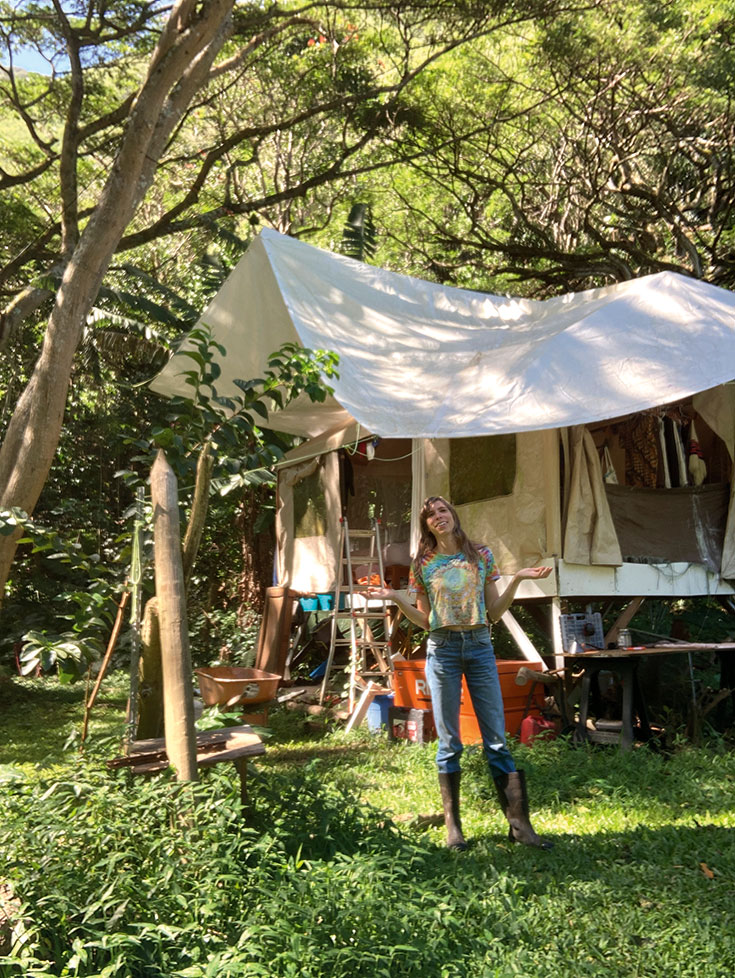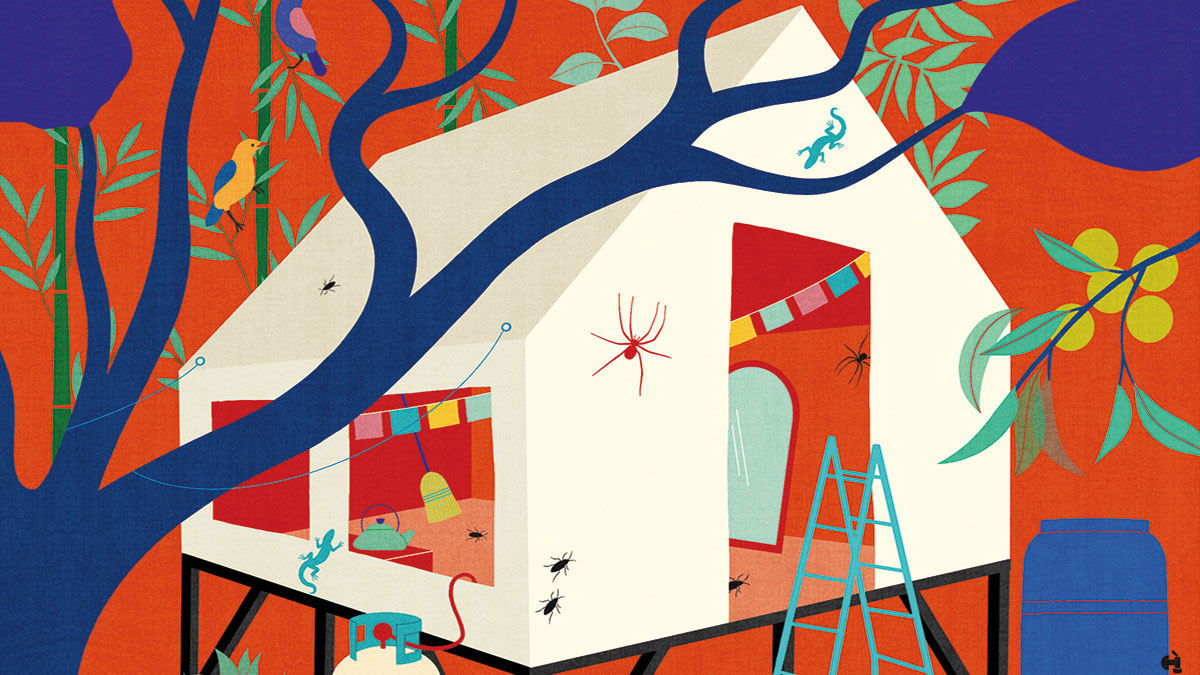The tent was ten feet wide by twenty feet long, and its plastic roof and walls were the color of raw chicken. It had two large windows whose mesh screens were green with algae and black with mold; geckos laid delicate white eggs in the rolled-up weather flaps.
My husband and I lived in this tent for nine months when he was getting back on his feet after a mental health crisis. At the time, I experienced the tent and the land surrounding it as a place of intense anxiety. I feared the brown hunting spiders with their huge egg sacks, and the cockroaches, which were forever scuttling out of dark corners. When the wind blew at night, I worried that a branch from one of the tall, muscular monkeypod trees would snap off and crush us in our bed. When we left the tent to get supplies, I worried people would steal our tools or propane. After all, there was no way to lock up what we had.
The lack of security was matched with a lack of privacy. My husband befriended the houseless people who lived nearby, who dropped in at all hours to share food or gossip or simply to sit on one of the overturned buckets that passed for chairs and smoke. While he reveled in this new “family,” I felt nervous and exposed. I wanted a door to close against the spiders, the geckos, and the warm, damp wind that made my clothes mold. I wanted a door to lock against the addicted, the troubled, and the poverty-stricken people who constituted our new friends. Most of all, I wanted to live in a house again, not in a tent that provided only the barest protection against the world.
“If I armored my home, would I soon armor my heart, forgetting the birds, insects, and humans that had once been my friends?”
After nine months passed, we did move into a house, and set about acquiring all the luxuries, which had been unavailable to us in the tent. But after a brief period of recovery, my husband decided to end his mental health treatment, while increasing his intake of marijuana and alcohol. The results were disastrous. He went on angry tirades that could last for hours, his frame of reference drifting further and further from any common ground. No amount of pleading, reasoning, or rallying friends and family could convince him to get help. Frightened to be alone with him, I packed some clothes, left the comfortable home we shared, and drove to the land where our old tent still stood, its pale pink walls bleached white by the sun and worn as soft as bedsheets. After just a few nights away from him, I realized to what extent I’d been sacrificing my health in an effort to prop up his. I decided to end the marriage for good and start a new life in the tent.
The place that had once represented danger to me now became my refuge; the place where my nerves had once sung with anxiety now became the peaceful cocoon where I could slowly recover from the stress of my husband’s rages. Indeed, I found that everything that had once bothered me about the tent was now a gift. There was no internet or cell service, which meant I had the space I needed to fully experience my grief and shock. There was no running water, which meant long, healthful walks to a nearby spring; no electricity, which meant reading by candlelight and going to bed early. At night when I sat on the unpainted plywood floor to meditate, the warm wind sang all around me, the metal tent frame creaking, flexing, but always, always, holding up.

I came to know the creatures who shared this humble space with me: the huntsman spider with its long legs and furry back, the black witch moth who’d flutter in the open tent flaps at night, pasting its body to the wall, and even the cockroaches who nested in the sleeves of my raincoat, scuttling out when I pulled it down from its hook. At sunrise and sunset, I’d listen to the cacophony of myna birds in the neighbor’s bamboo patch, their shrieks a riotous celebration of the sun’s appearance and fading away. At night, I’d wake up to the sound of dogs barking, roosters crowing, wild boars grunting, or wild horses stampeding down the trail just twenty feet from where I lay.
As my strength returned, I found that I even had the capacity for the social interactions, which had overwhelmed me before. I could carry my neighbor’s groceries to the ramshackle hut where he lived with his cats, dogs, and pigs; I could give my troubled, addicted, and poverty-stricken neighbors a friendly word and a ride into town. The armor I’d found so necessary the first time I’d lived in the tent had softened. I no longer yearned for a door to close, much less a door to lock; indeed, I felt myself to be embedded in a rich and vital web of life, and I didn’t yearn for very much at all.
I lived in the tent for sixteen months, patching the roof with duct tape, sweeping the floor, lashing down the wall flaps when the wind blew them loose. I made modest improvements, which would allow me to work: a solar panel here, a rain barrel there. I marveled at how well my humble surroundings met my needs. The Buddha said that people need a basic level of food, shelter, clothing, and medicine before they can meaningfully practice the dharma; I realized that, from the moment I’d come back to the tent, I’d had all four. Not only did I have shelter, but I had a good raincoat and boots, a long-sleeved shirt to protect me from sun, and a sweater to keep me warm on cold nights. There were wild potatoes in the forest, luscious stands of tree spinach in my garden, and fruit trees at my neighbor’s house, which I was free to harvest.
There was medicine, too: not only the medicinal herbs and leaves that grew abundantly in the forest and that my next-door neighbor taught me to prepare, but the medicine of friendship, community, shared labor, and common purpose. In the weeks after I first reappeared in the tent, my neighbors fed me, watched out for me, and helped me find work. Sheltered, clothed, fed, receiving medicine, I felt the wealthiest I’d ever been in my life.
I also felt a sense of awe at how well the tent sheltered me. Why build a proper structure at all? The weather on this side of the island was temperate; with the monkeypod trees to shade me, I rarely got too hot, and except for the occasional winter night when an Arctic wind blew in across the ocean, I never got too cold. It seemed to me that, threadbare as it was, the tent might last forever. As long as I kept replacing the big tarp that covered the roof, I’d be fine.
Then one day, a tropical storm passed by, bringing heavy rains and wind. Although my tent had weathered countless storms over the years, outperforming many homes whose metal roofs peeled off like the pop tops on tin cans, this time the floor was soaked, and the plywood on my makeshift desk rippled with water.
For weeks, I wrestled with what to do. Should I buy a replacement tent, or finally build a small structure? If I had a solid roof over my head, would I then seek more and more comforts and luxuries, until I was just as insulated—and as lonely—as a queen in her castle? If I armored my home, would I soon armor my heart, forgetting the birds, insects, and humans that had once been my friends?
More hurricanes were forecast; I walked to my neighbor’s house and asked if I might hire him to build me a roof.
Now, a ten-by-twenty cabin stands where the old tent once did. There are half-walls to let in the light and birdsong, and an awning to keep boots and backpacks dry. I’ve succumbed to several luxuries: a mirror, a lamp, a proper chair. But I haven’t yet put a door in the doorframe, and I’m not sure I ever will.

